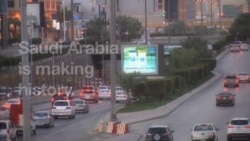Women in Saudi Arabia are voting for the first time in municipal elections that will also feature the country’s first women candidates for local council seats.
Men and women began entering segregated polling stations across the country beginning at 8:00 a.m. local time Saturday when voting officially got under way.
This change is part of the late King Abdullah’s legacy. Abdullah, who died in January, issued a decree in 2011, authorizing women to vote: “Starting with the next election, women have the right to nominate themselves for the membership of the municipal councils.”
Campaigning has not been easy for women candidates. Saudi Arabia has strict rules of segregation of the sexes so female candidates cannot address male voters unless there is a partition. The only other way they can communicate to potential voters is through male relatives.
WATCH: Video report
“We have been waiting to be given this opportunity for the last 10 years. Ten years as ladies to participate in the political and social decision-making in the country,” said Fawzeya al-Harbi, a female local municipal council election candidate.
Human Rights Watch says it has also been hard for women to register to vote.
The advocacy organization said many voting registration centers were far away from where the female voters live and that they were hard to find. Saudi women are banned from driving.
Human Rights Watch also argued Saudi women faced issues when it came to proving their identities. Authorities now allow women to get ID cards but many do not have them. Women also have difficulty providing proof of residence because they do not usually own property.
“The government should fix the problems that are making it hard for women to participate and build on this progress to create momentum for further women’s rights reforms,” said Sarah Leah Whitson, Human Rights Watch Middle East director.
Acceptance of change
There has been little public criticism against the participation of women, and younger generations say they support it.
“The late King Abdullah requested for the right of woman to run the municipal elections and this has been implemented now. We as the young generation are supporting the women and will help them and we are with the elections,” Yazid al-Ajlan said, a young Saudi citizen.
But the number of women who registered to vote on Saturday are only a small portion of the total number of voters. They make up almost 131,000 out of the country’s 1.49 million registered voters.
There are also about 980 female candidates compared to almost 6,000 men. Few women, if any, are predicted to win any of the 2,100 council seats that are in play.
The 284 councils are the only part of the government that can be elected by its citizens, and only two thirds of 3,159 seats are elected. The rest are appointed by the minister of municipal and rural affairs.
The councils have only limited responsibilities, including overseeing small, local projects such as budgets for public facilities like roads and parks.
The first municipal election was held in 2005.






